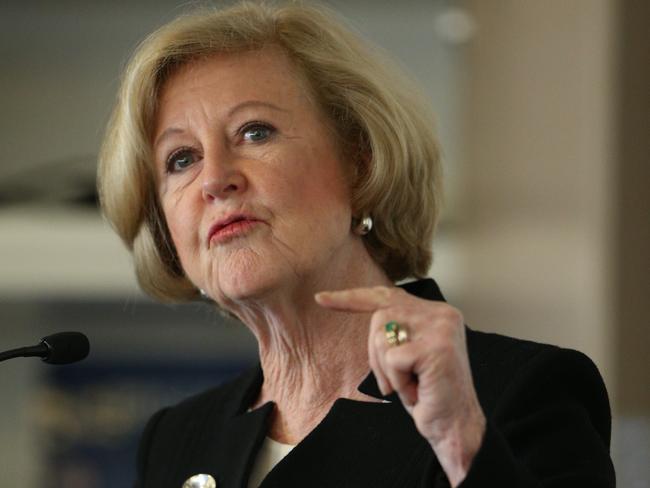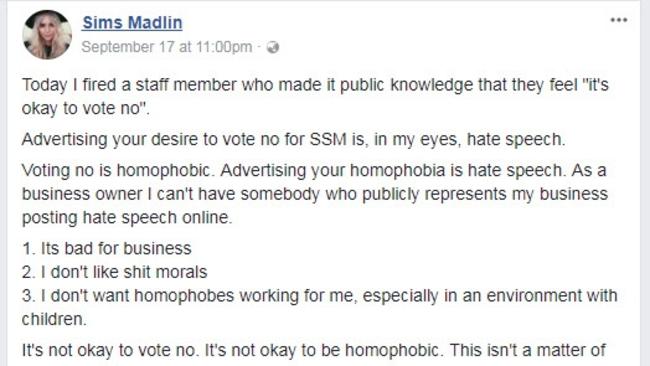
If ever you wonder about the next phase of encroachment upon free speech in Australia, look no further than developments in Britain.
Last Monday, the Electoral Commission of the United Kingdom, in a submission to an inquiry into the intimidation of political candidates, recommended the disqualification of voters in cases of “abusive behaviour in relation to candidates and campaigners”.
You can read our submission to @PublicStandards review into intimidation of parliamentary candidates here https://t.co/t6ya5m0HRH
— Electoral Commission (@ElectoralCommUK) September 18, 2017
No, the commission was not referring to disqualification for those found guilty of terrorism, treason, regicide, hacking the electoral database, attempting a coup d’état, or other heinous offences that threaten the very nature of democracy. If legislated, the government will remove democracy’s flagship right for those deemed to have violated the prescribed standards of behaviour.
This is ironic, given the politicians are among the worst offenders when it comes to disparaging others. What is more, they have almost carte blanche to do it thanks to parliamentary privileges which provide for immunity against defamation proceedings.
Westminster, like its Australian counterpart, has had its fair share of opportunists, dissemblers, hypocrites and careerists. In 2009, a parliamentary expenses scandal revealed systemic fraud in the claiming of entitlements, resulting in a mass repayment of suspect claims, and the prosecution and jailing of six politicians. You may think that engendering respect for politicians should begin with their being an exemplar of good behaviour, but that is a common misconception among the great unwashed.
In attempting to justify its recommendation, the commission cited the results of a survey it had sent to candidates who stood in the June 2017 elections. Of the 3,304, less than a quarter (24 per cent) responded. Thirteen responses, that being around 0.39 per cent of all candidates, cited “issues of intimidation”, although only five outlined “first-hand experience of intimidation”.
Presumably these acts of intimidation involved the most dastardly of deeds? After all, the commission was using these examples to justify the removal of a fundamental right. Well, not quite it appears.
“One respondent said they were harassed by attendees at the count,” the submission notes. Another respondent claimed that a fellow candidate “was rude and aggressive to them”. Some candidates cited examples of “posters being ripped down and vandalised”. Not exactly on par with the last days of the Weimar Republic, is it?
The commission also noted the claims of one respondent who was “subjected to covert and overt bullying, dirty tricks and misogyny.” The submission did not elaborate on these claims. Conveniently, the claims cannot be tested as the responses were confidential.
As with that nebulous phrase ‘hate speech’, any accusations of misogyny are now held to be self-evident. Indeed, any attempt to ascertain the evidence for such a charge is itself frowned upon, the insinuation being that the questioner is a denialist. For example, who could forget the editorial board of Macquarie Dictionary’s decision in 2012 to expand the definition of ‘misogyny’ following then PM Julia Gillard’s denouncement? When was the time you heard an ABC journalist apply that organisation’s customary ‘so-called’ preface when referring to ‘hate speech’?
Diane Abbott, UK Labour’s shadow Home Secretary, is one of the loudest proponents for reform. She has been the subject of death threats and has been called names such as “fat bitch” and “nigger”. Such terms are despicable, and fortunately British police are quick to prosecute these offences, which frequently result in custodial sentences.
But Abbott herself has a long history of using racist barbs. First elected to Parliament in 1987, she went on the following year to claim that Britain “invented racism” and was “one of the most fundamentally racist nations on Earth”. In 1996 she criticised the appointment to a local hospital of “blonde, blue-eyed girls from Finland”, claiming it was preferable instead to import “nurses from the Caribbean who know the language and understand British culture and institutions.”
“White people love playing ‘divide & rule’,” she tweeted in 2012. “We should not play their game.” She, however, is very adept at playing the game of victim politics with her own get-out-of-jail-free card.
In recent years Britain, as with Australia, has witnessed the rise of the professional politician, together with an increase in the appointment of unelected tribunes such as so-called human rights commissioners. Supposedly egalitarian in nature, both professions are increasingly seen as arrogant and elitist. What better way of protecting entrenched interests than legislation which ostensibly guards the body politic, but in reality discourages criticism of those in power?
Much of the criticism against Abbott is in fact well-founded. Her interview in May this year with radio host Nick Ferrari was of the most excruciatingly bad performances in British politics. When asked what it would cost to fund Labour’s pledge of 10,000 extra police officers, Abbott provided a figure of £300,000. That equates to 30 quid per officer. Challenged about that she responded with a figure of “about £80m pounds”. But that’s only £8000 per officer, Ferrari responded incredulously, as Abbott tried to fudge it.
This performance was by no means a one-off. Only a month later, Abbott was interviewed on Sky News about the Harris Report, which inquired into Britain’s capacity to respond to a major terrorist incident. Despite claiming she had read the report, she was unable to detail a single one of its 127 recommendations. Abbott later claimed her Type 2 diabetes was “out of control” at the time.
Whether it was illness or incompetence we do not know, but pundits were right to be alarmed that Abbott could not answer straightforward questions about her brief. But according to Anoosh Chakelian of the New Statesman, the media had an “obsession with lampooning Abbott”, citing approvingly Labour’s claim that it amounted to a “dogwhistle racist coverage”. Is it racist to expect the alternative Home Secretary — the portfolio responsible for national security — to know what she is talking about?

Closer to home, we have seen this phenomenon evolve, particularly in the case of Gillian Triggs, former president of the Australian Hunan Rights Commission. No, that misspelling was intentional. Hunan is the birthplace of the former Chinese leader Mao Zedong, who would have sympathised with Triggs’s lamenting that peasants could say what they liked around the kitchen table.
Triggs, as will be recalled, was rightfully criticised for perceived bias (especially in her decision to delay holding an inquiry into children in detention when Labor was in power), and her providing inaccurate information to Senate Committees. Yet much of the mainstream media glossed over this, particularly the ABC, portraying her as a human rights martyr. Even the United Nations objected to the criticism of Triggs, taking the unusual step of contacting Fairfax media to do so. Clearly elitists look after their own. What next, the equivalent of lèse-majesté laws? Contempt of commissar, perhaps?

And why stop at punishing those who criticise public officials? For those who vote ‘no’ in the same sex marriage survey, it is fast becoming a case of ‘Don’t ask, don’t tell’. To do otherwise is to be the subject of virtue-bullying, as Canberra teenager ‘Madeline’ discovered this week when she was sacked by her boss Madlin Sims for publicly stating she would vote ‘no’ in the survey.
“Advertising your desire to vote no for SSM is, in my eyes, hate speech,” posted Sims. “I can’t have anyone who publicly represents my business posting hate speech online.” How hateful an act is it for an employer to publicly dismiss and disparage a teenager for voting against her boss’s wishes?
A sick public culture in which these destructive idiocies are given license. It's not free speech. It's an assault. https://t.co/01o9RlgnbY
— Jonathan Green (@GreenJ) September 19, 2017
“A sick public culture in which these destructive idiocies are given license,” tweeted ABC presenter Jonathan Green in response to a far-right group’s plan for a ‘Straight Lives Matter’ rally in Sydney this weekend. “It’s not free speech,” he remarked, “It’s an assault.” As Daily Telegraph journalist Tim Blair succinctly observed, “Jonathan wasn’t quite so furious when Labor politicians voted No.”
Whether it is cracking down on criticism of politicians or officials, or publicly shaming those whose opinions are verboten, you have to wonder how far the inroads into free speech will go. “One of the things we’ll be looking at is this very point of whether or not we should set a standard about speech generally,” said shadow Attorney-General Mark Dreyfus in March this year.
Sound ominous? Perhaps it is only a matter of time before what is said around the kitchen table could see you answer to a tribunal. Best say and do nothing impertinent, and respect one’s betters. After all, mother knows best.




To join the conversation, please log in. Don't have an account? Register
Join the conversation, you are commenting as Logout